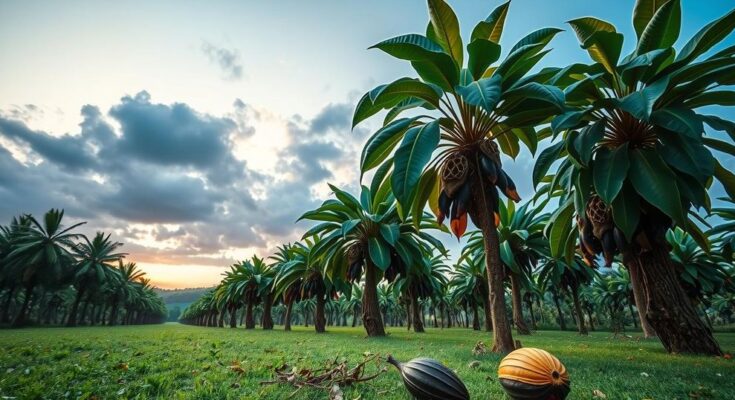Recent research indicates that climate change is negatively impacting cocoa production, resulting in higher chocolate prices and reduced availability. Studies show rising temperatures hinder cacao growth, with farmers facing significant challenges and economic strain. Urgent measures are needed to address these issues affecting both chocolate prices and livelihoods in cocoa-producing regions.
Climate change is adversely affecting the production of chocolate, a beloved treat in the UK, according to recent studies. Research conducted by Climate Central indicates that cocoa, the essential ingredient in chocolate, is increasingly challenging to cultivate due to rising temperatures. This trend is projected to elevate chocolate prices and potentially limit availability in the future.
In addition to pricing concerns, a report by the UK charity Christian Aid reveals the detrimental impact on cocoa farmers. Climate Central’s decade-long analysis of temperatures in major cocoa-producing regions found that excessive heat has made it impossible to maintain sustainable cacao growth during critical three-week periods each year.
The cacao plant thrives in temperatures below 32 degrees Celsius (89.6 degrees Fahrenheit). However, recent data suggests that climate change has extended periods of excessive heat by three additional weeks in regions such as Ghana and Ivory Coast, which account for a significant portion of global cocoa production. This heightened heat disrupts plant viability, which affects both the quality and quantity of cocoa yields.
The implications of this temperature increase are concerning. Observations indicate that the past year was the hottest on record, with cocoa-producing regions experiencing temperatures above 32 degrees Celsius on 42 occasions. Contributing factors such as increased rainfall and insect infestations exacerbate this situation, leading to a steep rise in cocoa prices by 136% from July 2022 to February 2024.
Finally, cocoa farmers are facing economic challenges as the price of cocoa rises but yields decline. Osai Ojigho, the director of policy and public campaigns at Christian Aid, stated, “Growing cocoa is a vital livelihood for many of the poorest people around the world and human caused climate change is putting that under serious threat.” This highlights the urgent need for solutions to support these vulnerable farming communities.
In summary, climate change poses a significant threat to cocoa production, which may lead to increased chocolate prices and reduced availability. The recent studies indicate that rising temperatures adversely affect the quality and quantity of cocoa crops, while also jeopardizing the livelihoods of farmers. Ongoing monitoring and innovative solutions are essential to mitigate these challenges and support those dependent on cocoa farming.
Original Source: www.bbc.co.uk




